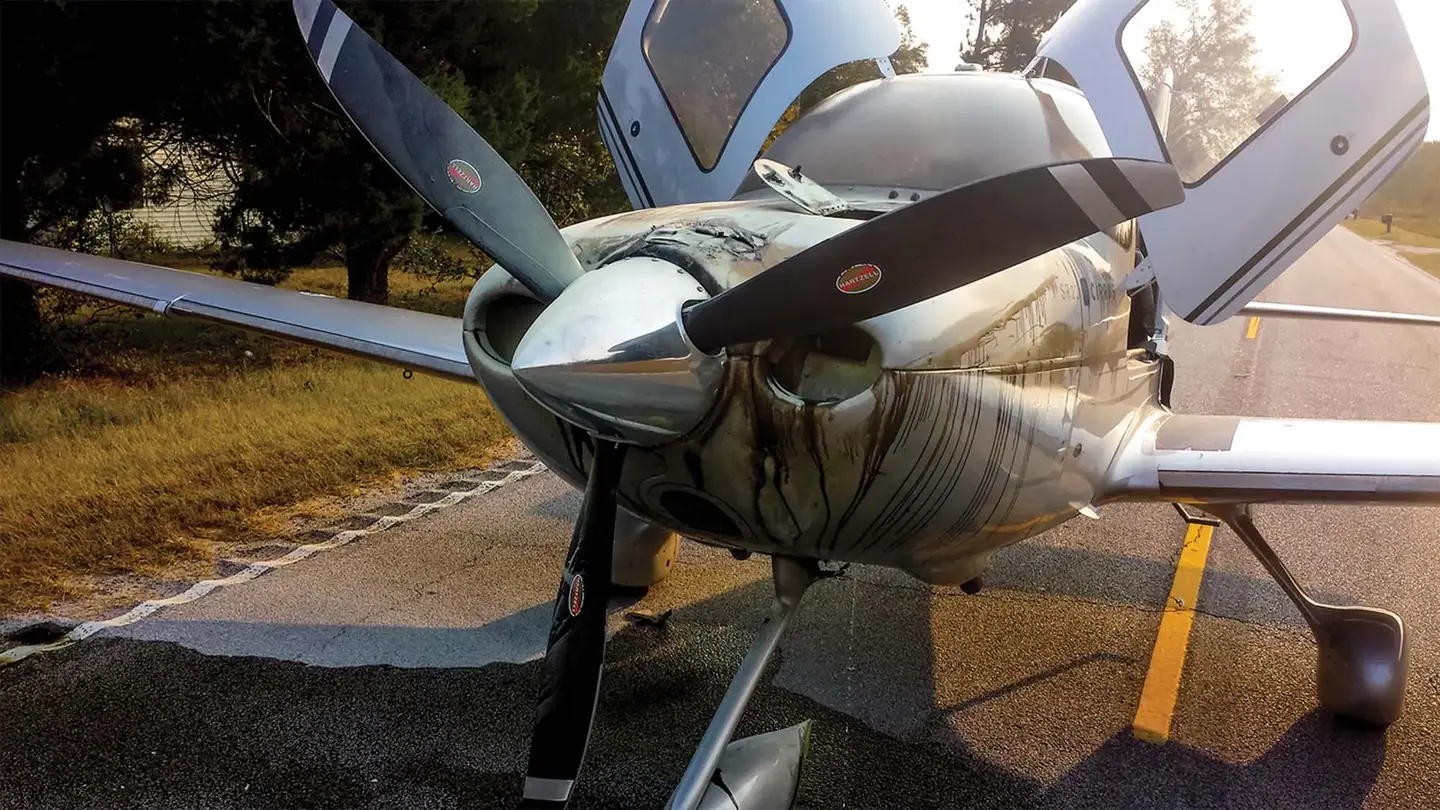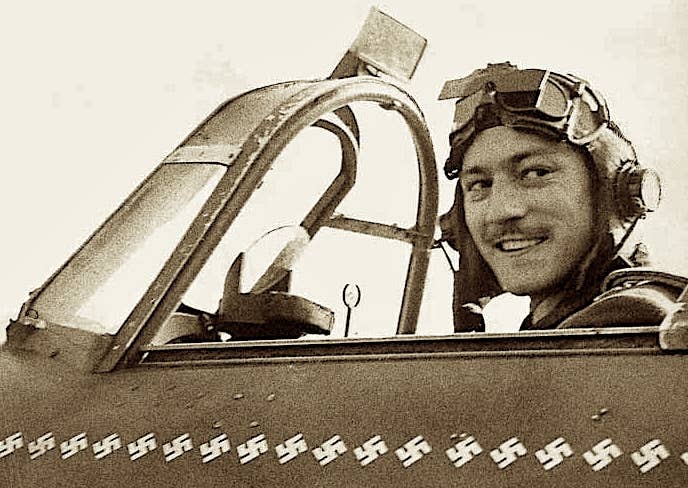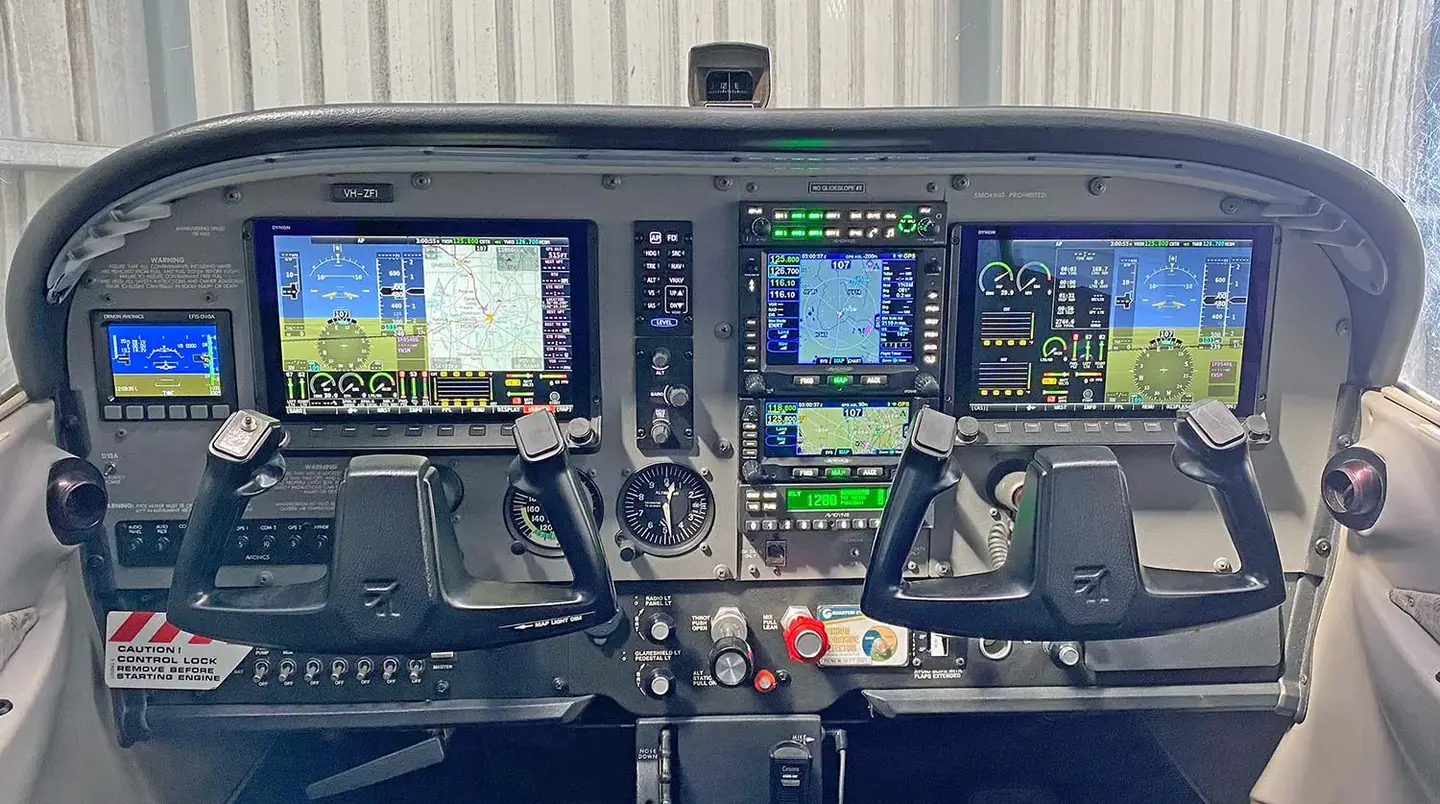Eye of Experience #42:Some People (Just Don’t Belong in the Air)
The old saw that “anyone can learn to fly – it just takes some longer than others” may have been true of the cadet population during World War II, but it’s not necessarily true of today’s aspiring pilots. AVweb’s Howard Fried assaults that truism, and many students’ beliefs that meeting the FAA’s minimum-time requirements is all they need to do, with the stories of three students he has worked with in his career.
 When I was an aspiring young aviation cadet in the old Army Air Corps during World War II, we were told that anybody can learn to fly - some just take longer than others. It was probably true then, because that group was carefully selected for aptitude, but I have since learned that it is not entirely true of the general population. The following three stories will serve to illustrate my point.
When I was an aspiring young aviation cadet in the old Army Air Corps during World War II, we were told that anybody can learn to fly - some just take longer than others. It was probably true then, because that group was carefully selected for aptitude, but I have since learned that it is not entirely true of the general population. The following three stories will serve to illustrate my point.
Package Deals
While cleaning out my office desk the other day I came across a letter that set me to thinking about one of my favorite pet peeves. I have always been opposed to the concept of flight schools offering a package deal - a specific dollar amount for a private certificate (no guarantee, of course). These packages are usually based on the legal minimum amount of dual and solo flight time, not taking into account such things as materials (books, computer, plotter, etc.), AME's fee, ground instruction, examiner's fee, etc. No matter how thoroughly it is explained to the prospective student that there will likely (no doubt) be an overrun, the prospective flight student gets it into his/her head that when the 35 or 40 hours, as the case may be, are up, the school owes him or her a private certificate.
 A similar concept is the student who believes that when he or she has met the minimum-time requirement of instruction and solo practice, the FAA owes him/her the certificate or rating, completely disregarding the fact that there are other requirements in the four general areas of medical, knowledge, experience, and skill.
A similar concept is the student who believes that when he or she has met the minimum-time requirement of instruction and solo practice, the FAA owes him/her the certificate or rating, completely disregarding the fact that there are other requirements in the four general areas of medical, knowledge, experience, and skill.
Such an individual was Dr. Ming Toy Chaing (not his real name). Dr. Chaing was a math professor at a large university, and he came to my flight school with a private certificate seeking training for an instrument rating. He specifically wanted me to undertake his training, saying that he wanted a more mature instructor, and "not one of those young kids." The letter that brought Dr. Chaing's case to mind was one I wrote in response to a request from the GADO (General Aviation District Office of the FAA, later a FSDO - Flight Standards District Office). It seems that Dr. Chaing had busted an instrument checkride (with another examiner), requested and received a recheck by an FAA inspector which he passed, and then demanded that the failure be removed from his permanent record at the Aeronautical Center in Oklahoma City. At the time I received the request I had not seen nor spoken to Dr. Chaing for over two years. My letter follows:
| GADO 20, etc. N. R. Humphrey, Principal Operations Inspector Dear Sir: Per your request, I am herewith setting forth the details regarding the relationship between Dr. Ming-Toy Chaing and my flight school. If memory serves, Dr. Chaing first came to us in mid 1977 for a BFR under FAR 61.57. At that time I assigned him to Rodger Miller, who was then the Chief Flight Instructor on our Part 141 Primary curriculum, and he successfully completed a review, although Mr. Miller reported that Dr. Chaing's performance was "marginal, but satisfactory." Rodger also recommended that we not rent him any of our school airplanes, even for day VFR flight. In April of 1978, Dr. Chaing again showed up at our office and undertook instruction toward an instrument rating. He requested that I, personally, give him his dual instruction, expressing the thought that he could better relate to a more mature individual as opposed to a younger instructor. I explained that my schedule at that time did not permit the addition of another applicant, but that Rodger was available. He expressed satisfaction with Rodger, having flown with him a year previously. At that time Dr. Chaing had been training elsewhere, and, as is often the case, he felt that upon reaching the minimum experience requirement, he should have been recommended for the rating. We, Rodger and I, tried (unsuccessfully I believe) to disabuse him of this concept, explaining that many, if not most applicants require more training than the minimum to be properly prepared for certification. Although Dr. Chaing was not formally enrolled in our air agency-approved course, Rodger made out a training folder for him (primarily for the instructor's guidance), a copy of which is attached hereto. After approximately five hours of instruction, Dr. Chaing felt that he was not making the progress he should, and I recommended another flight school (AeroEd) where Dr. Chaing could work with a mature, patient instructor (Mr. Minock), and Dr. Chaing took my suggestion. About a month later he was back, stating that Minock, like everybody else was holding him back for economic reasons. I then assigned him to Jon Rose for evaluation and training. Mr. Rose's report is attached hereto. After Rose flew with him (once), I gave Dr. Chaing a brief (approximately one-half hour) flight for which I did not charge him, either for the aircraft or for my time. It is my considered opinion that Dr. Chaing is not capable of operating in the IFR system, without substantially more training and experience. In fact, he may never acquire the necessary skill. Just because he meets the minimum experience requirement and has passed the written examination for the instrument rating does not, as you well know, necessarily qualify him for recommendation. Very truly yours, etc. |
For the next several years we would hear Dr. Chaing's distinctive Chinese accent on the radio as he blundered about in the IFR system in the local area.
A Chip On Her Shoulder
 The next case is also unique. In my opinion, this person was so unstable she should have been caught by the AME (aviation medical examiner) and denied a medical certificate. Ms. Smith (not her real name) came to us after having been given up on by three other flight schools. I assigned her to Chuck, the very best flight instructor I have ever had the privilege of knowing.
The next case is also unique. In my opinion, this person was so unstable she should have been caught by the AME (aviation medical examiner) and denied a medical certificate. Ms. Smith (not her real name) came to us after having been given up on by three other flight schools. I assigned her to Chuck, the very best flight instructor I have ever had the privilege of knowing.
Ms. Smith had a chip on her shoulder. She was very deep into the women's lib movement and she argued with everything Chuck told her or tried to teach her, claiming that the entire world is against her because she is a woman. Chuck finally gave up in desperation and recommended her for her private checkride, hoping she might have a good day and pass.
I was the examiner, and in 17 years as an examiner, giving over 4,000 flight tests, Ms. Smith is the only one about whom I have had second thoughts. She gave me such a marginal ride that I should have disapproved her application and issued her a pink slip, but, frankly, I was afraid to bust her, so I issued her a Private Pilot Certificate.
The aftermath is this: I have several friends at the local FSS (Flight Service Station) and in the local control tower, and this woman is still argumentative. When she calls for a weather briefing and they tell her what she doesn't want to hear, she argues with them, claiming that they are being unfair because she is a woman, and when the tower controller issues instructions contrary to what she wants, she does the same thing. This person most definitely does not belong in the airspace!
Ace Of The Base?
My final example is a story I have told here before, but it bears repeating. One day I received a phone call from a Mr. George Rock (not his real name), a man in his early fifties who said he had been a fighter pilot during the second world war, flying P-51s. The guy was an ace and had the records to prove it, having shot down five enemy aircraft in the Pacific. He had been issued a Commercial Pilot Certificate with Single Engine Land privileges upon separation from the service, had been out of flying for many years, and now he wanted an Instrument Rating on his certificate, saying a few hours of brush-up would do the trick. I invited him to come in, and I assigned him to Chuck, the best we had. Mr. Rock was a very nice man and a very successful stockbroker. He came in every evening for his instrument lesson.
As Chief Flight Instructor on our primary curriculum (he had replaced Rodger by this time), Chuck had a private office in our hangar building, and on a couple of occasions I stood just outside the door to his office and listened to him brief George prior to their actual flight lesson. I stood there amazed as Chuck asked him about what they had done the day before, (ADF approaches, for example) and Mr. Rock seemed to have no idea what Chuck was talking about. After over a dozen hours of flight and a score of hours of ground instruction, George had his feet firmly planted on square one. Chuck finally gave up and assigned Mr. Rock to Dennis, who put several more hours into attempting to see some progress, without success. Again, this was an individual to whom we wouldn't rent an airplane for even day VFR flying. Finally, I gently advised Mr. Rock to take up golf or tennis, or something other than aviation.
 The next time I heard about George Rock was when Ed, the chief flight instructor at another flight school on the airport, called and said he'd finally gotten George ready for his instrument checkride and wanted to schedule him with me. I politely declined, since the school where he had been training had a staff examiner. George took his flight test with Pat, the staff examiner at that school. It took him four tries to get the rating. Each time he'd get a couple of the tasks of the PTS (Practical Test Standards) satisfactory, thus leaving fewer unsatisfactory parts for the next time until he finally got the last couple right and was issued the rating.
The next time I heard about George Rock was when Ed, the chief flight instructor at another flight school on the airport, called and said he'd finally gotten George ready for his instrument checkride and wanted to schedule him with me. I politely declined, since the school where he had been training had a staff examiner. George took his flight test with Pat, the staff examiner at that school. It took him four tries to get the rating. Each time he'd get a couple of the tasks of the PTS (Practical Test Standards) satisfactory, thus leaving fewer unsatisfactory parts for the next time until he finally got the last couple right and was issued the rating.
I next heard about George Rock a couple of years later, when I got a call from Elanore, Ed's wife and the office manager at that other flight school. She called to ask if I was available to give a multiengine flight test in their Cessna 310 on Saturday morning. When I said yes, she replied that Ed had George Rock ready for his multiengine rating. An examiner is designated for privates, commercials, instruments, etc., but for each specific make and model of twin he has to have a separate letter of authority. Well, there were only two 310 examiners in the district; me, and a retired FAA inspector who was based some 60-odd miles away. Therefore, I reluctantly scheduled George for Saturday morning. I told Elanore that she should call me next time she and Ed were alone in their office so that I could talk with Ed privately. The next day I met with Ed and explained that I knew George's difficulty with retention and I suggested to him that if he wanted to be sure George passed his test, he, Ed, should take him out Saturday morning before the test and put him through everything in the PTS. Ed's reply was, "No. He's perfectly fine and he's all ready."
Saturday morning George showed up, and after looking over his paperwork, I asked him to do a weight and balance and, using today's data, compute an accelerate-stop distance. He replied, "Ya want me to do a weight and balance?" I explained that it goes with the territory and that on every checkride he'll ever take he'll have to work a weight and balance problem.
 He said, "I left my book in the car. I'll go get it." He returned with the little Cessna 310 Owner's Manual in hand, and when I told him that wouldn't do, that he had to use the actual weight and CG of the airplane we'd be flying, he replied, "What's the matter? This book is for that model."
He said, "I left my book in the car. I'll go get it." He returned with the little Cessna 310 Owner's Manual in hand, and when I told him that wouldn't do, that he had to use the actual weight and CG of the airplane we'd be flying, he replied, "What's the matter? This book is for that model."
I then sent him out to the airplane to fetch the Approved Flight Manual with the actual weight and when he returned we discovered that there was some 600 pounds difference between the airplane and the sample in his little Owner's Manual. He was shocked.
After nursing him through the weight and balance problem, he then asked me what I meant by accelerate-stop distance. I explained that to him and led him through it in the manual. After this, I started writing down his answers, and after about an hour of attempting unsuccessfully to draw one right answer out of him - and believe me, I'm skillful at finding it out if the applicant knows it whatever "it" is - I gave up and disapproved his application for a multiengine rating. The following week he and another applicant flew the 60-some miles to the other 310 examiner and both passed their flight tests. (I wonder how they did that since both were multiengine students and not authorized to carry passengers?)
The following week, to the very day, George Rock died in an airplane. He and a passenger were taking off in a Mooney into IFR conditions. A few hundred feet off the ground on takeoff they entered cloud and George pulled the mixture control instead of the carb heat knob. They crashed into a cemetery just off the departure end of the runway, and both died on impact.
These three people convinced me that the Army Air Corps was wrong in saying that anybody can learn to fly, given enough time. I'm sure each of you, my readers know of such people, and there's nothing we can do about it.
Usual Boilerplate: If you have a comment regarding this column, please post it here rather than sending it to me by direct email. That way others may benefit from your input.






